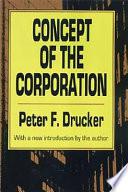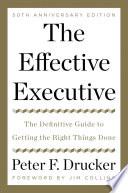Works

The Essential Drucker
Peter F. Drucker
Concept of the Corporation
Peter F. Drucker
Effective Executive
Peter F. DruckerFamous Peter F. Drucker Quotes
Source: 1930s- 1950s, The Practice of Management (1954), p. 387
Source: 1990s and later, Managing for the Future: The 1990's and Beyond (1992), p. 139
Variant: There is nothing so useless as doing efficiently that which should not be done at all.
Peter F. Drucker Quotes about people
Source: 1960s - 1980s, MANAGEMENT: Tasks, Responsibilities, Practices (1973), Part 1, p. 317
The Effective Executive (1966)
1960s - 1980s
Peter F. Drucker: Trending quotes
Peter F. Drucker Quotes
Source: 1960s - 1980s, MANAGEMENT: Tasks, Responsibilities, Practices (1973), Part 1, p. 343
“There is only one valid definition of a business purpose: to create a customer.”
Source: 1930s- 1950s, The Practice of Management (1954), p. 37
Adventures of a Bystander (1979) (Autobiography)
1960s - 1980s
I got my degree through E-mail http://www.forbes.com/forbes/1997/0616/5912084a.html, Forbes (June 16, 1997)
1990s and later
“Management is doing things right; leadership is doing the right things.”
Misattributed
Variant: Efficiency is doing the thing right. Effectiveness is doing the right thing.
Source: The Essential Drucker
Source: Managing the Non-Profit Organization: Principles and Practices
“"Loafing" is easy, but "leisure" is difficult.”
Source: 1960s - 1980s, MANAGEMENT: Tasks, Responsibilities, Practices (1973), Part 1, p. 185
Source: 1930s- 1950s, The End of Economic Man (1939), p. 7
Drucker cited in: William White (1981) Library journal. Volume 106, Nr 1-12. p. 1048
1960s - 1980s
“The days of the 'intuitive' manager are numbered.”
Source: 1930s- 1950s, The Practice of Management (1954), p. 93, cited in Henry Mintzberg (2005) Managers Not MBAs (2005). p. 10
“There is a point of complexity beyond which a business is no longer manageable.”
Source: 1960s - 1980s, MANAGEMENT: Tasks, Responsibilities, Practices (1973), Part 3, p. 681
“Organizationally what is required - and evolving - is systems management.”
Source: 1960s - 1980s, MANAGEMENT: Tasks, Responsibilities, Practices (1973), Part 3, p. 761
Source: 1960s - 1980s, MANAGEMENT: Tasks, Responsibilities, Practices (1973), Part 2, p. 465
“One has to make a decision when a condition is likely to degenerate if nothing is done.”
Source: 1960s - 1980s, MANAGEMENT: Tasks, Responsibilities, Practices (1973), Part 2, p. 475
“The worker's effectiveness is determined largely by the way he is being managed.”
Source: 1960s - 1980s, MANAGEMENT: Tasks, Responsibilities, Practices (1973), Part 2, p. 380
Source: 1960s - 1980s, MANAGEMENT: Tasks, Responsibilities, Practices (1973), Part 3, p. 707
“The most important thing in communication is to hear what isn't being said.”
Variant: The most important thing in communication is to hear what is not being said.
“The purpose of business is to create and keep a customer.”
Variant: There is only one valid definition of a business purpose: to create a customer.
Source: 1930s- 1950s, The Practice of Management (1954), p. 37
Source: Innovation and Entrepreneurship: Practice and Principles
Source: 1930s- 1950s, The End of Economic Man (1939), p. 149
Concept of the Corporation (1945)
compare Dwight Eisenhower's January, 1961 Farewell Speech
1930s- 1950s
Source: 1930s- 1950s, The End of Economic Man (1939), pp. 13-14
Source: 1990s and later, Managing for the Future: The 1990's and Beyond (1992), p. 139
“A success that has outlived its usefulness may, in the end, be more damaging than failure.”
Source: 1960s - 1980s, MANAGEMENT: Tasks, Responsibilities, Practices (1973), Part 1, p. 159
The New Pluralism Leader to Leader, No. 14 (Fall 1999)
1990s and later
Source: 1930s- 1950s, The End of Economic Man (1939), p. 24
“Communism is evil. Its driving forces are the deadly sins of envy and hatred.”
Source: 1930s- 1950s, Landmarks of Tomorrow: A Report on the New 'Post-Modern' World (1959), p. 249
Managing Knowledge Means Managing Oneself Leader to Leader, No. 16 (Spring 2000)
1990s and later
“The only thing we know about the future is that it is going to be different.”
Source: 1960s - 1980s, MANAGEMENT: Tasks, Responsibilities, Practices (1973), Part 1, p. 44
Source: 1930s- 1950s, The Future of Industrial Man (1942), p. 64
Source: 1930s- 1950s, The End of Economic Man (1939), p. 246
Source: 1960s - 1980s, MANAGEMENT: Tasks, Responsibilities, Practices (1973), Part 3, p. 672
Source: 1930s- 1950s, The Practice of Management (1954), p. 284
Source: 1930s- 1950s, The End of Economic Man (1939), pp. 14-15
Civilizing the City, Leader to Leader, No. 7 (Winter 1998)
1990s and later

